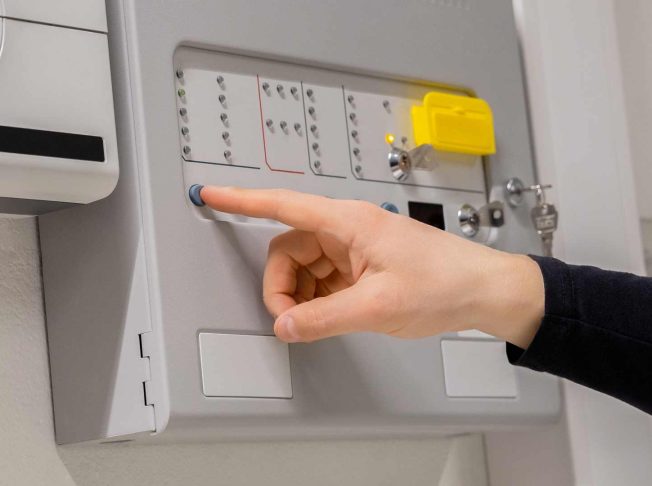Difference between addressable and conventional fire alarm systems

If you’re considering installing a fire alarm system in your commercial premises, then there are a number of decisions you will need to make. There is a variety of fire alarm systems available each of which have their own advantages. One key difference is between between addressable and conventional fire alarm systems.
What are addressable fire alarm systems and what is the difference between a conventional and addressable fire alarm system?
What is an addressable fire alarm?
An addressable fire alarm system provides advanced fire and smoke detection within a building. In a conventional fire alarm system multiple devices are connected to a single circuit. In addressable fire alarm systems each device has its own unique address or identifier. This means that devices such as smoke detectors, heat detectors, and manual call points are connected to a control panel through a loop or network. The control panel can monitor and receive information from each device, displaying specific information such as the device location and its status.
When a device detects fire or smoke it then sends a signal to the control panel along with its address. This allows the control to identify the exact location of the event.
What are the advantages of an addressable fire system?
Addressable fire systems have a range of advantages for property owners. The primary advantage is the improvement in locating fire and smoke. This enables faster response times both from people on site and emergency responders. The extra information it provides helps to reduce false alarms and allow for better zone identification.
Fires and smoke can be isolated and its spread prevented. New devices can also be added to the system over time as needs adjust.
Addressable fire systems have enhanced functionality and monitoring capabilities. These make it easier to use and improves the safety of people and property, and the overall effectiveness of managing fire-related emergencies.
Are there any disadvantages of an addressable fire alarm system?
Addressable fire alarm systems are an increasingly popular choice giving property owners and managers added protection and greater control over fire safety. The addressable fire alarm system price is generally higher than conventional systems due to added equipment, installation and maintenance costs. They require specialist design and installation, and the initial configuration will take longer than with a conventional system.
Addressable fire alarm system wiring tends to be more complex. Maintenance and troubleshooting can be more extensive. Addressable fire alarm systems will typically require a dedicated power supply, adding complexity and requiring additional electrical infrastructure. Addressable fire alarm system programming can take longer and be more challenging to master.
Despite these drawbacks, addressable fire alarm systems are often the preferred choice in larger buildings due to their advanced functionality and improved response capabilities compared to a conventional fire alarm.
How many devices can be in an addressable fire alarm system?
The number of devices that can be included in an addressable fire alarm system can vary depending on several factors. These factors include the specific system model and how the installation has been designed, the control panel specifications, wiring infrastructure and power supply capabilities.
However, addressable fire alarm systems typically support a larger number of devices compared to conventional systems. Modern addressable fire alarm systems can support extensive networks with multiple loops, allowing for the inclusion of a significant number of devices. This makes addressable fire alarm systems a practical choice in larger buildings.
Addressable fire alarm system vs conventional fire alarm system
Addressable fire alarm systems provide precise location information by assigning a unique address to each device, allowing for faster response times and better event management. They offer advanced features but are more complex and expensive compared to conventional systems. Conventional systems are easier to install and usually simpler to maintain but do not offer the same degree of functionality and protection.
Should I choose an addressable or a conventional fire alarm system?
Addressable systems are recommended for larger buildings or facilities where precise event location, advanced features, and faster response times are crucial.
Conventional systems are generally more suitable for smaller buildings or those with budget constraints, where simplicity and cost-effectiveness are prioritised over advanced functionality. Fire safety specialists will be able to advise about what might be the most suitable for your building.
Addressable Fire Alarm Systems from Protive Security & Surveillance
Protive Security & Surveillance provide a comprehensive range of Fire Alarm Systems offering open protocol solutions which enable Conventional, Addressable, and Wireless Fire Alarms.
Our expert engineers will guide you from the initial plans and architectural drawings, through to the installation and setup of your system.
To find out more, please fill out our contact form or call us on 01925 661752.
Back